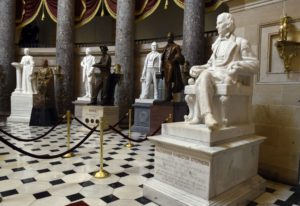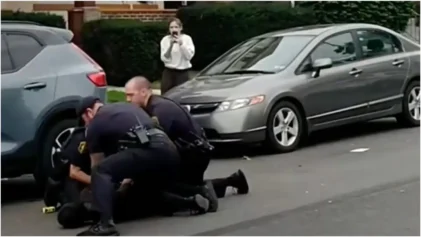
Statue of Alexander Hamilton Stephens, the Confederate vice president throughout the American Civil War, is on display in Statuary Hall on Capitol Hill in Washington. (AP Photo/Susan Walsh, File)
WASHINGTON (AP) — House Minority Leader Nancy Pelosi called Thursday for the removal of Confederate statues from the U.S. Capitol as the contentious debate over the appropriateness of such memorials moved to the halls of Congress.
Pelosi asked Speaker Paul Ryan to join Democrats in supporting legislation to remove the Confederate statues. The legislation can’t pass without support from Republicans, who control both chambers of Congress.
Pelosi said the statues in the Capitol should “embody our highest ideals as Americans, expressing who we are and who we aspire to be as a nation.”
Pelosi’s challenge comes as violence during a rally in Charlottesville, Va., has stoked calls to remove Confederate statues elsewhere. About 10 statues in the Capitol’s Statuary Hall are of men who served as Confederate soldiers or politicians.
“The Confederate statues in the halls of Congress have always been reprehensible,” Pelosi said in a statement. “If Republicans are serious about rejecting white supremacy, I call upon Speaker Ryan to join Democrats to remove the Confederate statues from the Capitol immediately.”
Each state is allowed to place two statues in the Capitol’s National Statuary Hall. Doug Andres, a spokesman for Ryan, said the display of statues is a decision for the states to make.
The statues in Statuary Hall are required to be of someone deceased for at least 10 years and must be made of marble or bronze. An exception was made for the statue of Rosa Parks, which was moved to its current location in 2013, as well as for any replacement statues, according to a Congressional Research Service report.
Among the statues present are of those of Gen. Robert E. Lee, Virginia; Jefferson Davis, president of the Confederate States of America, Mississippi; and Alexander Hamilton Stephens, the Confederate vice president, Georgia.
Sen. Cory Booker, a New Jersey Democrat, announced earlier that he would be sponsoring legislation to remove Confederate statues from the Capitol.
“This is just one step,” Booker said. “We have much work to do.”
President Donald Trump is strongly criticizing efforts to remove memorials and tributes to the Confederacy.
“You can’t change history, but you can learn from it,” he tweeted Thursday. “Robert E. Lee. Stonewall Jackson — who’s next, Washington, Jefferson? So foolish. …
“Also the beauty that is being taken out of our cities, towns and parks will be greatly missed and never able to be comparably replaced!”
Senate Minority Leader Chuck Schumer, D-N.Y., said it was important to work toward the goal of Booker’s legislation, but he also sought to keep the attention on Trump’s comments about what occurred in Charlottesville.
“We must continue to denounce and resist President Trump for his reprehensible actions,” Schumer tweeted.
Similarly, an aide to Sen. Tim Kaine, D-Va., said the senator supports Booker’s proposal, but he is focused on other issues as well.
A spokeswoman for Kaine, Sarah Peck, said the senator “also believes the Senate needs to work to combat hate crimes and address the fundamental inequities in our society that have left African-Americans and families of color in this country with far less wealth, higher unemployment rates, fewer opportunities and less protection under the law.”
Democratic lawmakers are also calling for Congress to focus more attention on the threat of domestic terrorism. The House Homeland Security Committee will hold a hearing on Sept. 12, with the panel’s chairman urging lawmakers to question witnesses on the dangers posed by domestic terrorists and other extremist groups. But Democrats complained that the hearing was part of an annual review that had already been scheduled before the Charlottesville events. They wanted more time to go into detail to address the threat from white supremacists and neo-Nazi groups.
“After years of requests for congressional hearings and the deaths of many, this is nothing more than an attempt to distract from a topic the Republicans are unwilling to address,” said Rep. Bennie G. Thompson, the committee’s ranking Democratic member.
Rep. Mike McCaul, the Republican chairman of the committee, said of the hearing: “Racial intolerance deserves no place in America, and it is imperative that we find ways to rid our nation of the scourge of white supremacism.”


